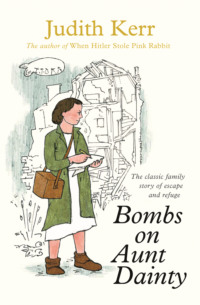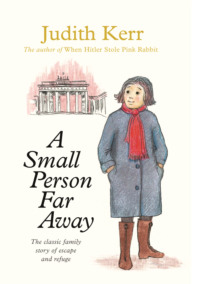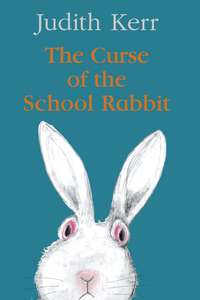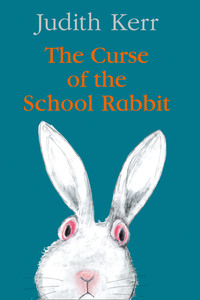
Полная версия
Out of the Hitler Time trilogy: When Hitler Stole Pink Rabbit, Bombs on Aunt Dainty, A Small Person Far Away
“Lovely,” said Max.
“Now where’s the dish …and some salt …oh!” cried Mama, “I’ve got another lot of potatoes to do!” She looked appealingly at Papa. “Dearest, can you pass me the colander?”
“Which is the colander?” said Papa.
By the time the meal was ready on the table it was nearly an hour later and Anna felt so tired that she no longer cared whether she ate anything or not. But she did not like to say so as Mama had gone to so much trouble. She and Max ate their supper quickly and sleepily and then fell into bed.
Through the thin walls of the flat they could hear the murmur of voices and a clattering of dishes. Mama and Papa must be clearing the table.
“You know, it’s funny,” said Anna just before she went to sleep. “I remember when we lived in Berlin Heimpi used to make us fried potatoes with scrambled egg. She used to say it was quick and easy.”
“I expect Mama needs more practice,” said Max.
Chapter Thirteen
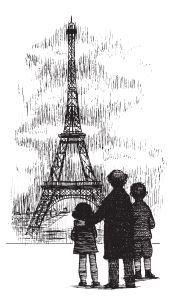
When Anna woke up in the morning it was bright daylight. Through a gap in the yellow curtains she could see a patch of windy sky above the rooftops. There was a smell of cooking and a clicking sound which she could not at first identify, until she realized that it was Papa typing in the room next door. Max’s bed was empty. He must have crept out while she was still asleep. She got up and wandered out into the hall without bothering to dress. Mama and Grete must have been busy, for all the luggage had been cleared away and through the open door she could see that Mama’s bed had been turned back into a sofa. Then Mama herself appeared from the dining room.
“There you are, my darling,” she said. “Come and have some breakfast, even though it’s nearly lunch-time.”
Max was already installed at the dining-room table, drinking milky coffee and pulling pieces off a long and incredibly thin loaf of bread.
“It’s called a baguette,” explained Mama, “that means a stick” – which was exactly what it looked like.
Anna tried some and found it delicious. The coffee was good too. There was a red oilcloth on the table which made the cups and plates look very pretty, and the room was warm in spite of the blustery November day outside.
“It’s nice here,” said Anna. “We wouldn’t have been able to have breakfast in our pyjamas at the Gasthof Zwirn.”
“It’s a bit small,” said Mama. “But we’ll manage.”
Max stretched himself and yawned. “It’s nice having our own place.”
There was something more that was nice. Anna could not at first think what it was. She looked at Mama pouring coffee and at Max tilting back his chair as he had been told a hundred times not to. Through the thin walls she could hear Papa’s typewriter. Then it came to her.
“I don’t really mind where we are,” she said – “as long as we’re all together.”
In the afternoon Papa took them out. They went on the Underground which was called the Metro and had a peculiar smell. Papa said it was a mixture of garlic and French cigarettes and Anna rather liked it. They saw the Eiffel Tower (but did not go up it because it would have cost too much) and the place where Napoleon was buried, and at last the Arc de Triomphe which was quite near home. By this time it was getting late, but Max noticed that you could go up to the top and that it was quite cheap, probably because it was not nearly as high as the Eiffel Tower – so they went.
No one else wanted to go to the top of the Arc de Triomphe on this cold, dark afternoon and the lift was empty. When Anna stepped out at the top she was met by an icy blast of wind and a prickle of raindrops and she wondered whether it had been a good idea to come. Then she looked down. It was as though she were standing at the centre of a huge sparkling star. Its rays stretched out in all directions and each one was a road lined with lights. When she looked closer she could see other lights which were cars and buses crawling along the roads, and immediately below they formed a bright ring circling the Arc de Triomphe itself. In the distance were the dim shapes of domes and spires and the twinkling spot which was the top of the Eiffel Tower.
“Isn’t it beautiful?” said Papa. “Isn’t this a beautiful city?”
Anna looked at Papa. His overcoat had lost a button and the wind was blowing through it, but Papa did not seem to notice.
“Beautiful,” said Anna.
It was nice to get back to the warm flat, and this time Grete had helped Mama with the supper and it was ready in good time.
“Have you learned any French yet?” asked Mama.
“Of course not,” said Grete before anyone else could answer. “It takes months.”
But Anna and Max found that they had picked up quite a few words just from listening to Papa and other people. They could say “oui” and “non” and “merci” and “au revoir” and “bonsoir, Madame”, and Max was particularly proud of “trois billets s’il vous plaît” which was what Papa had said when he bought tickets for the Metro.
“Well, you’ll know a lot more soon,” said Mama. “I’ve arranged for a lady to come and give you French lessons, and she’s starting tomorrow afternoon.”
The lady’s name was Mademoiselle Martel and the following morning Anna and Max tried to collect everything they would need for her lesson. Papa lent them an old French dictionary and Mama found them some paper to write on. The only thing neither of them had was a pencil.
“You’ll have to go and buy some,” said Mama. “There’s a shop at the corner of the street.”
“But we can’t speak French!” cried Anna.
“Nonsense,” said Mama. “Take the dictionary with you. I’ll give you a franc each and you can keep the change.”
“What’s the French for pencil?” asked Max.
“Un crayon,” said Mama. Her voice did not sound as French as Papa’s but she knew quite a lot of words. “Now off you go – quickly.”
By the time they had travelled down in the lift by themselves – and it was Anna’s turn to press the button – Anna felt quite bold about the enterprise, and her courage did not falter even when she found that the shop was rather grand and sold more office equipment than stationery. Clutching the dictionary under her arm she marched through the door ahead of Max and said in ringing tones, “Bonsoir, Madame!”
The owner of the shop looked astonished and Max nudged her.
“That’s not a Madame – that’s a Monsieur,” he whispered. “And I think bonsoir means good evening.”
“Oh!” said Anna.
But the man who owned the shop did not seem to mind. He smiled and said something in French which they could not understand. They smiled back.
Then Anna said hopefully, “Un crayon,” and Max added, “S’il vous plaît.”
The man smiled again, searched in a cardboard box behind the counter and produced a beautiful red pencil which he handed to Anna.
She was so amazed at her success that she forgot to say “Merci” and just stood there with the pencil in her hand. This was easy!
Then Max said, “Un crayon,” because he needed one too.
“Oui, oui,” said the man, smiling and nodding and pointing to the pencil in Anna’s hand. He agreed with Max that it was a pencil.
“Non!” said Max. “Un crayon!” He sought about for a way to explain. “Un crayon,” he cried, pointing to himself. “Un crayon!”
Anna giggled because it looked as though Max were introducing himself.
“Aah!” said the man. He took another pencil out of the box and handed it to Max with a little bow.
“Merci,” said Max, much relieved. He gave the man the two francs and waited for the change. After a while it appeared that there wasn’t any. Anna was very disappointed. It would have been nice to have some money.
“Let’s ask him if he has any other pencils,” she whispered. “They might be cheaper.”
“We can’t!” said Max.
“Well, let’s just try,” said Anna who was sometimes very pig-headed. “Look up the French for other.”
Max leafed through the dictionary while the man watched him curiously. At last he found it. “It’s ‘autre’,” he said.
Anna smiled brightly and held out her pencil to the man. “Un autre crayon?” she said.
“Oui, oui,” said the man after a moment’s hesitation. He gave her another pencil from the box. Now she had two.
“Non,” said Anna, handing one of the pencils back to him. His smile was getting a bit frozen. “Un autre crayon …” – she made a face and a shape with her fingers to suggest something infinitely small and unimportant.
The man stared at her to see if she was going to do anything else. Then he shrugged his shoulders and said something hopeless in French.
“Come on!” said Max, pink with embarrassment.
“No!” said Anna. “Give me the dictionary!” She turned the pages feverishly. At last she found it. Cheap …bon-marché.
“Un bon-marché crayon!” she cried triumphantly, startling two ladies who were examining a typewriter. “Un bon-marché crayon, s’il vous plaît!”
The man looked very tired. He found another cardboard box and took from it a thinner blue pencil. He gave it to Anna who nodded and gave him back the red one. Then the man gave her twenty centimes change. Then he looked questioningly at Max.
“Oui!” said Anna excitedly. “Un autre bon-marché crayon!” and the procedure was repeated with Max’s pencil.
“Merci,” said Max.
The man just nodded. He seemed worn out.
“We’ve got twenty centimes each,” said Anna. “Think of what we’ll be able to buy with that!”
“I don’t think it’s very much,” said Max.
“Still, it’s better than nothing,” said Anna. She wanted to show the man that she was grateful, so as they went out of the shop she smiled at him again and said, “Bonsoir, Madame!”
Mademoiselle Martel arrived in the afternoon – a French lady in a neat grey suit, with a shaggy pepper and salt bun. She had been a school teacher and spoke a little German, a fact which so far had been of little interest to anyone. But now Paris was suddenly crowded with refugees from Hitler, all eager to learn French, and she was run off her feet trying to give them all lessons. Perhaps, thought Anna, this was the reason for the perpetual expression of mild surprise on her slightly faded face.
She was a good teacher. Right from the beginning she spoke French to the children nearly the whole of the time, using sign language and mime when they did not understand.
“Le nez,” she would say, pointing to her well-powdered nose, “la main”, pointing to her hand, and “les doigts”, wiggling her fingers. Then she would write the words down for them and they would practise spelling and pronouncing them until they knew them. Occasionally there were misunderstandings, such as when she said “les cheveux”, pointing to her hair. Max became convinced that cheveux meant bun and burst into embarrassed giggles when she asked him to point out his own cheveux.
On the days when she did not come to give them a lesson they did homework. At first they just learned new words but after quite a short time Mademoiselle Martel demanded that they write little stories in French.
How could they? asked Anna. They didn’t know enough French.
Mademoiselle Martel tapped the dictionary with her finger. “Le dictionnaire,” she said firmly.
It turned out to be a terrible struggle. They had to look up almost every word and it took Anna nearly all morning to write half a page. Then, when she showed it to Mademoiselle Martel at their next lesson, most of it was wrong anyway.
“Never mind, it will come,” said Mademoiselle Martel in one of her rare excursions into German, and “Never mind, it will come!” Max said mockingly to Anna the following day, when she was still struggling after more than an hour to put down some boring incident between a dog and a cat.
“What about you? You haven’t done yours yet, either,” said Anna crossly.
“Yes I have,” said Max. “A page and a bit.”
“I don’t believe it.”
“Look for yourself!”
It was quite true. He had written more than a page and it all looked like French.
“What does it mean?” Anna asked suspiciously.
Max translated with a flourish.
“Once a boy had his birthday. Many people came. They had a big feast. They ate fish, meat, butter, bread, eggs, sugar, strawberries, lobsters, ice cream, tomatoes, flour …”
“They wouldn’t eat flour,” said Anna.
“You don’t know what they ate,” said Max. “Anyway, I’m not sure that word is flour. I looked it up at the time but I’ve forgotten.”
“Is all this a list of what they ate?” asked Anna, pointing to the page crawling with commas.
“Yes,” said Max.
“What is this last bit?” There was just one sentence at the end which had no commas in it.
“That’s the best part,” said Max proudly. “I think it means ‘then they all burst’.”
Mademoiselle Martel read Max’s composition without batting an eyelid. She said she could see it had increased his vocabulary. But she was less pleased when, for the following day’s homework, he produced an almost identical piece. This one began “Once there was a wedding,” and the food the wedding guests ate was different, but it ended with everyone bursting as before. Mademoiselle Martel frowned and drummed her fingers on the dictionary. Then she told Max very firmly that he must write something different next time.
Next morning the children were sitting at the dining-room table with their books spread out on the red oilcloth as usual. Anna was wrestling with a piece about a man who had a horse and a cat. The man liked the cat and the cat liked the horse and the horse liked the man but it did not like the cat …It was sickening stuff to be turning out when there were so many interesting things she could have written about if only she had been able to write in German.
Max was not writing anything at all, but staring into space. When Grete came in and told them to clear their things away because she wanted to lay the table for lunch his sheet of paper was still blank.
“But it’s only twelve o’clock!” cried Anna.
“I shan’t have time to do it later,” said Grete crossly as usual.
“Well, there’s nowhere else we can work – this is the only table,” said Max – and they prevailed on her, with difficulty to let them keep it a little longer.
“What are you going to do?” asked Anna. “We want to go out this afternoon.”
Max seemed to come to a decision. “Pass me the dictionary,” he said.
As he leafed through it briskly (they were both becoming very practised at this) Anna heard him murmuring “funeral” under his breath.
When Mademoiselle Martel came to give them their next lesson she read Max’s composition in silence. Max had done his best to introduce variety into his basic theme. The funeral guests in his story – no doubt carried away by grief – ate paper, pepper, penguins, pemmican and peaches in addition to less exotic foodstuffs, and after his usual punch line about how they all burst at the end Max had added the words, “So there were many more funerals.”
Mademoiselle Martel did not speak at all for a few moments. Then she gave Max a long, hard look and said, “Young man, you need a change.”
When Mama came in at the end of the lesson as she often did to ask how the children were getting on, Mademoiselle Martel made a little speech. She said she had taught them now for three weeks and that they had made good progress. But the time had come when they would learn more by being with other children and hearing French spoken all round them.
Mama nodded. Clearly she had been thinking the same thing.
“It’s nearly Christmas,” she said. “Perhaps you would give them one or two more lessons before the holidays, and then they can start school.”
Even Max worked hard during the remaining time. The prospect of going to a school where no one spoke anything but French was rather daunting.
And then Christmas was upon them. Grete went home to Austria for a holiday a few days before, and as Mama was busy cooking the flat soon became rather dusty. But it was so much pleasanter without Grete’s grumpy presence that no one minded. Anna looked forward to Christmas and dreaded it all at the same time. She looked forward to it because you couldn’t not look forward to Christmas, but she was also terribly afraid that it would make her think of Berlin and of what Christmas used to be like – what it had been like even the year before.
“Do you think we’ll have a tree?” she asked Max. In Berlin there had always been a big tree in the hall, and one of the delights of Christmas had been to recognize the many coloured glass balls, the birds with the feathery tails and the trumpets which you could actually blow, as they reappeared each year to decorate it.
“I don’t think the French go in for Christmas trees very much,” said Max.
However, Mama managed to get one just the same. When Papa called the children at tea-time on Christmas Eve for the celebrations to begin and they rushed into the dining room, it was the first thing Anna saw. It was only a little tree – about two feet high – and instead of glass ornaments Mama had hung it with tinsel and covered it with little candles. But it looked so pretty, shining green and silver above the red oil-cloth of the table, that Anna suddenly knew that Christmas would be all right.
Presents were modest compared with previous years, but perhaps because everyone needed them more they enjoyed them just as much. Anna had a new paint box and Max a fountain pen. Omama had sent some money and Mama had bought Anna new shoes with her share. Anna had had to try them on in the shop, so they were not a surprise – but Mama had hidden them away immediately afterwards so that they would still be new for Christmas. They were thick brown leather with gold buckles and she felt very grand in them. She also had a pencil sharpener in a little case and a pair of hand-knitted red socks from Frau Zwirn, and when she thought she had seen all her presents she found one more – a very small parcel from Onkel Julius.
Anna opened it carefully and gave an exclamation of delight. “It’s lovely!” she cried. “What is it?”
Nestling in the tissue paper was a short silver chain hung with tiny animals. There were a lion, a horse, a cat, a bird, an elephant and of course a monkey.
“It’s a charm bracelet,” said Mama, fastening it round her wrist. “How nice of Julius!”
“There’s a letter with it,” said Max, handing it over. Anna read it out.
“Dear Anna,” it said, “I hope this little present will remind you of our many visits to the Berlin Zoo. It is not nearly so nice going there without you. Please give my love to your dear Aunt Alice. I hope she is well. Tell her I think of her often, and of her good advice which I should perhaps have taken. My love to you all. Yours, Onkel Julius.”
“What does it mean?” asked Anna. “We haven’t got an Aunt Alice.”
Papa took the letter from her. “I think he means me,” he said. “He calls me Aunt Alice because the Nazis often open letters and he could get into bad trouble if they knew that he was writing to me.”
“What advice did you give him?” asked Max.
“I told him to leave Germany,” said Papa and added under his breath, “Poor Julius.”
“I’ll write and thank him,” cried Anna, “and I’ll paint him a picture with my new paint box.”
“Yes,” said Papa, “and tell him Aunt Alice sends her love.”
Then suddenly Mama made a sound with which by now they were all familiar.
“My chicken!” she cried and rushed off to the kitchen. But it had not burned and soon they were sitting down to a real Christmas dinner, all cooked by Mama. As well as the chicken there were roast potatoes and carrots, and apple flan with cream to follow. Mama was becoming quite a good cook. She had even made gingerbread hearts because they belonged to a proper German Christmas. There was something wrong with them and they had gone soggy instead of being hard and crisp, but they tasted quite nice just the same.
At the end of the meal Papa poured them all some wine and they drank a toast.
“To our new life in France!” he said and they all repeated. “To our new life in France.”
Mama did not actually drink any of the wine because she said it all tasted like ink to her, but Anna liked it and drank a whole glassful. Her head felt muzzy when she finally got to bed and she had to close her eyes to stop the yellow lampshade and the wardrobe from whirling round and round.
It had been a nice Christmas, she thought. And soon she would go to school and find out what living in France was really like.
Chapter Fourteen
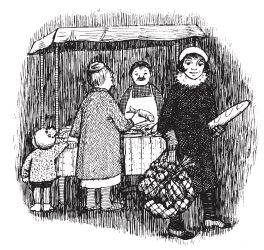
Anna did not go to school quite as soon as she had expected. Mama had arranged for Max to start at a lycée for boys early in January – a lycée was a French high school – but there were only very few lycées for girls in Paris and these were all full, with long waiting lists.
“We can’t afford a private school,” said Mama, “and I don’t think it would be a good idea for you to go to an école communale.”
“Why not?” asked Anna.
“They’re for children who are going to leave school very early and I don’t think the education is as good,” said Mama. “For instance, you wouldn’t be taught Latin.”
“I don’t need to learn Latin,” said Anna. “I’ll have my hands full trying to learn French. I’d just like to go to school!”
But Mama said, “There’s no rush. Give me a little while to look around.”
So Max went to school and Anna stayed at home. Max’s school was almost on the other side of Paris. He had to take the Metro early in the morning and did not get back till after five. Mama had chosen it, although it was so far away, because the boys there played football twice a week. At most French schools there was no time for games – only work.
The flat seemed dull and empty on the first day without Max. In the morning Anna went with Mama to do the shopping. The weather was bright and cold and she had grown so much in the past year that there was a huge gap between the top of her knitted socks and the hem of her winter coat. Mama looked at Anna’s goose-fleshy legs and sighed.
“I don’t know what we’re going to do about clothes for you,” she said.
“I’m all right,” said Anna. “I’m wearing the sweater you made me.”
This sweater, owing to Mama’s curious technique of knitting, had turned out so large and thick and dense that no cold could penetrate it, and was a most useful garment. The fact that only a few centimetres of Anna’s skirt protruded below it did not seem to matter.
“Well, if you’re sure you’re warm enough we’ll go to the market,” said Mama. “Everything is cheaper there.”
The market turned out to be some distance away and Anna carried Mama’s string bag while they walked through a number of winding little streets, until at last they emerged into a bustling road lined with shops and stalls. The stalls sold everything from vegetables to haberdashery and Mama insisted on inspecting them all before she bought anything, so as to be sure of getting the best value for her money.
The owners of shops and stalls alike were crying their wares, holding them up for people to see, and sometimes it was quite difficult for Anna and Mama to walk past, as onions and beautifully clean-scrubbed carrots were thrust in front of them to admire. Some shops specialized in only a few foods. One sold nothing but cheese, and there must have been at least thirty different kinds, all carefully wrapped in muslin, displayed on a trestle table on the pavement.




